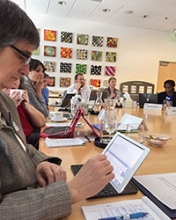Staff Assemblies Delegates Visit UC Merced
 Staff Assembly leadership from across the University of California system gathered at UC Merced earlier this month for the Council of UC Staff Assemblies (CUCSA) quarterly meeting.
Staff Assembly leadership from across the University of California system gathered at UC Merced earlier this month for the Council of UC Staff Assemblies (CUCSA) quarterly meeting.
During the three-day meeting, CUCSA delegates discussed topics of interest to staff members, received briefings on Office of the President staff initiatives and heard an update on an upcoming staff engagement survey.
The group also heard from UC Merced leadership about plans for the campus's growth. UC Merced Staff Assembly President Cindi Deegan and Vice President Pam Taylor represent UC Merced on the CUCSA delegation.
Representatives from the Office of the President in attendance included Vice President of Systemwide Human Resources Dwaine Duckett, Executive Director of Compensation Programs and Strategy Dennis Larsen, and Director of Employee Relations Marie Hairston.
Larsen provided a presentation on the rollout and implementation of Career Tracks for nonrepresented employees at other campuses. Hairston offered an update on online supervisor training available through the UC’s systemwide Learning Management System. Duckett addressed several topics, from plans to meet with CUCSA in the coming weeks to discuss employee benefit offerings in 2016 to ensuring that policy-covered employees have a voice.
“Policy-covered staff have a harder time being heard,” Duckett said. “One of the things I want to ensure is that everyone has advocacy. We need to have a culture at the university that takes a comprehensive embrace of all sectors.”
Campus leaders highlight 2020 Project
The delegates also heard from Provost and Executive Vice Chancellor Tom Peterson and Vice Chancellor for Business and Administrative Services Michael Reese about UC Merced, including the 2020 Project, academic focusing and strategic workforce planning efforts.
During UC Merced’s first phase of development, Peterson explained, the initial focus was to get the campus open. Now, Peterson said, “It’s time for us to take a look at the programs we’ve developed and see which ones, from a research perspective, can grow more rapidly and strategically.”
“There’s an incredible amount of work that needs to be done," he added. "There is not a single aspect of the campus that won’t be involved in 2020 planning.”
UC Merced’s 2020 Project — the plan that will add 1 million assignable square feet of space by 2020, essentially doubling the campus’s footprint — will allow the campus to accommodate up to 10,000 students.
Mark Aldenderfer, dean of the School of Social Sciences, Humanities and Arts and a professor of archeology and anthropology, closed the meeting with a presentation about his research project on adaptation and survival in high places.
UC Merced 'Ahead of the curve'
In addition to taking care of business, the delegates also were able to take in some of the sights surrounding UC Merced. They toured the campus, enjoyed a networking and dinner at Vista Ranch and Cellars and squeezed in a pre-meeting trip to Yosemite National Park.
"It was a very productive meeting for our council," Deegan said. "We were quite proud to have our leadership share some of the progressive initiatives and exciting research programs that are underway at UC Merced. We are the youngest and smallest campus but are definitely ahead of the curve in many ways."
The meeting was the third the CUCSA delegation has held at UC Merced. The group meets four times a year to share organizational best practices and to communicate and collaborate on staff issues. The next meeting will be held in June at UC Berkeley.
For more information about CUCSA, visit its website.
